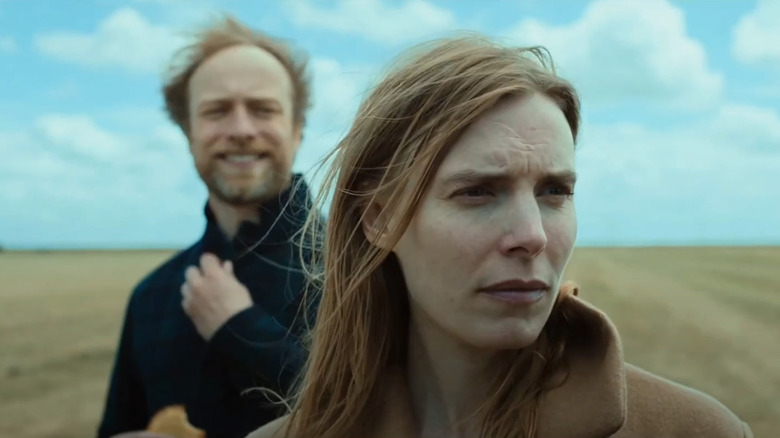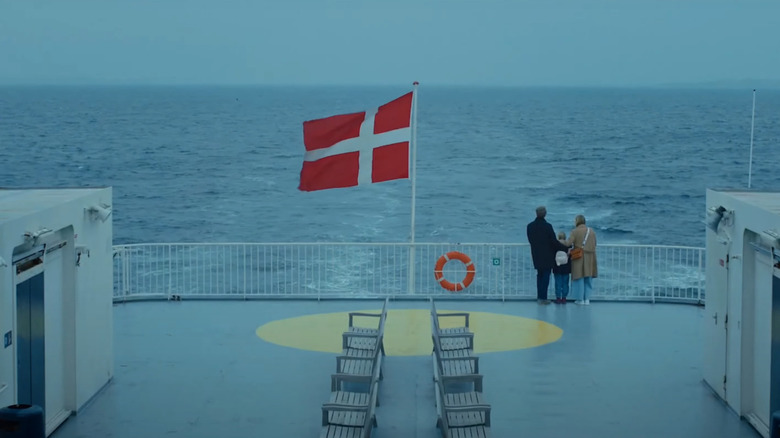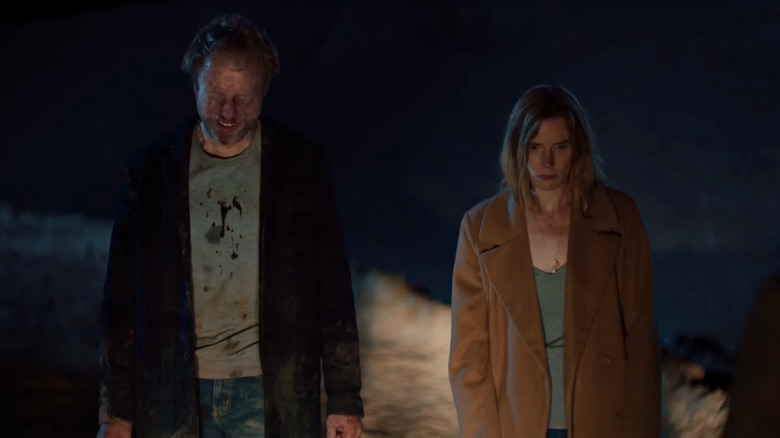Director Christian Tafdrup Didn't Realize How Relatable Speak No Evil Would Be
This post contains spoilers for "Speak No Evil."
Get ready for a new golden age of horror, as directors turn to the only genre besides superhero blockbusters that still brings people to movie theaters. Horror continues to evolve beyond its apparent genre confinements into a versatile tool for diverse and nuanced storytelling. We've already had standout examples of this with 2021's "His House," and the trend continued in 2022 with a slate of fascinating horror fare that included the genre confounding "Barbarian" and Jordan Peele's "Nope" — none of which were as disturbing, though, as "Speak No Evil."
The setup is simple: Two families meet while on a Tuscany excursion. By the end of their vacation, Danish couple, Bjørn (Morten Burian) and Louise (Sidsel Siem Koch), are comfortable enough with Dutch couple Patrick (Fedja van Huêt) and Karin (Karina Smulders) to accept an invitation to their country house in The Netherlands. Along with their daughter Agnes (Liva Forsberg), Bjørn and Lousie make the trip across the North Sea to visit their new friends, who eventually reveal themselves to be much more ominous than they originally seemed.
The couple's son, Abel, (Marius Damslev), is unable to speak due to what they claim is congenital aglossia — a birth defect causing him to be born without a tongue. Of course, that's absolutely not why the poor kid can't speak. The real reason is much more disturbing, as Bjørn and Louise eventually discover. Specifically, Patrick and Karin are killers with a taste for murdering parents, stealing their kids, and cutting out the children's tongues so they can go on vacation with them and meet more families to slaughter. You might be surprised to learn, then, that audiences seemed to find the whole thing quite relatable. Yes, you read that right.
'We're all in conflict about how we should behave'
The sinister truth behind Patrick and Karin's actions is unsettling enough, but the true horror comes from Bjørn and Louise's seeming inability to push back against their cruel tormentors. Even before the movie's horrific finale, the couple try to keep up appearances, maintaining a strained politeness in the face of Patrick and Karin's escalating malevolence. This unrelenting need to avoid conflict and appear comfortable and happy in social situations is actually what director Christian Tafdrup wanted to probe with his movie.
As he told RogerEbert.com, Tafdrup's goal was to interrogate the "awkwardness of human behavior" and the resulting "cringeness between people." The director drew from his own experiences traveling and meeting people he didn't know who turned out to be not quite as congenial as he'd initially thought. "Speak No Evil" pushes those experiences of meeting new people and the social norms of politeness that accompany them to their limits — specifically, Danish norms.
A native Dane, Tafdrup explained how his culture seemed uniquely devoted to conflict avoidance and politeness, saying, "I once thought suppressing feelings and being dictated by social behavior was a very Scandinavian problem." But having taken his horror movie around the world and observing reactions from global audiences, it quickly became apparent this was a much wider societal issue. Tafdrup expanded on the experience:
"What has surprised me, and been very pleasing, is that it's a more global film than I'd anticipated. [...] Now that we've played in so many different parts of the world, it's clear we're all in conflict about how we should behave and what we really feel. That's so human."
Recognizing evil
The exploration of social interactions was always going to resonate with audiences, no matter their cultural background and no matter how unsettling the end of that exploration was bound to be. We've all felt awkward in social situations, endlessly questioning our conduct and wondering how we come across to others. Those (very real) moments in the movie were a way to draw audiences in. But Christian Tafdrup pushes things to their limit, forcing those that maybe haven't suffered from social anxiety in the past to ask themselves some serious questions. As he explained to Gizmodo:
"It's a very human thing to expect the best out of people. But if some people sometimes don't want to do good things to you, do you have the tools to fight back, or do you even have the tools to recognize evilness?"
"Speak No Evil" remains one of the best horror films of 2022 for its striking depiction of a very real societal issue, even if it does push things to the extreme. Ultimately, the real horror arises precisely because audiences related to the film and asked themselves the kinds of questions Tafdrup identified. Yes, the couple's refusal to leave the country house at various points and their inability to defend their daughter in the final moments seems absurd. But it gets at something we all fear within ourselves — that we're not strong or confident enough to fight back when we need to. The film's extreme take on our capacity to avoid offending is chilling not just because of the horrific fate it brings for Bjørn and Louise, but because you get the feeling that, at its core, it might not be all that extreme after all.


